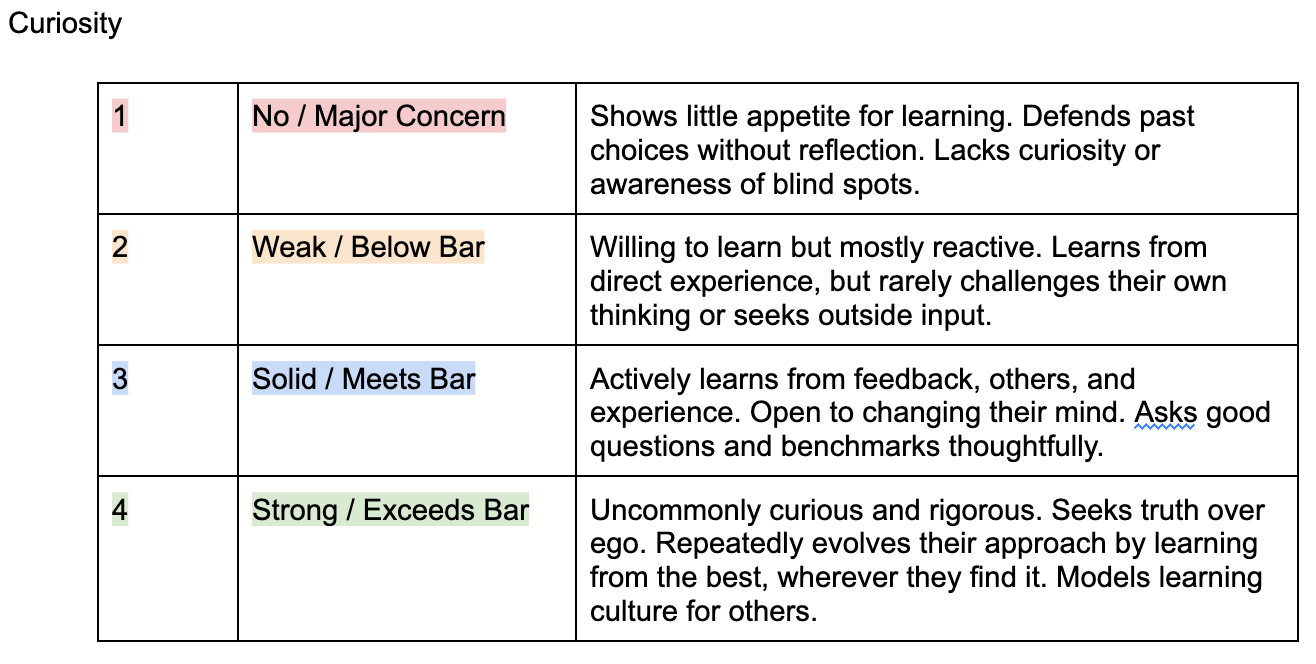Hiring before playbooks
By Jan Fiegel, Partner & Head of Talent
When you’re at the beginning of a journey, you don’t yet know what is along the road. You can guess you might need a B2C demand gen person, when in fact it will be partnerships-based distribution. Or the opposite.
When you’re hiring early generalists, you’re looking for someone who can figure it out.
Many interview processes fall into a trap: creating an endless wishlist of ideal traits. Worst of all, you may get to the end of a process and the business has changed, and what you needed has too.
We've learned to hire for three traits: agency, judgment, and curiosity. We didn't arrive at these arbitrarily. They emerged from years of observing patterns - watching who succeeded in zero-to-one environments, who struggled despite impressive credentials, and why we parted ways with otherwise talented people. These traits separated those who thrived in uncertainty from those who floundered, regardless of background or experience. They've become the foundation for how we evaluate candidates, develop team members, and even structure our organizations.
Curiosity: Seek truth over affirmation, change your mind, and learn from the best to raise the bar.
Curiosity is asking others to poke holes before a decision. It’s making assumptions explicit and updating them as you learn.
Curiosity is benchmarking. Assume you are not the best, instead go and learn. Most self-declared ‘world-class’ teams simply look in a mirror and like what they see.
Curiosity is not counting your stars that something went right, but understanding why it did.
Judgment: You’re right a lot, especially in your domain, and more broadly as you become more senior.
Judgment knows when to go fast and when to build for the long-term.
Judgement means having taste.
Judgement is being able to see a problem from all sides and then make the call.
Agency: Move things forward, no matter what, no matter who.
Agency is embracing progress over perfection.
Agency is taking full responsibility for results, even for things that aren’t your fault.
Agency is taking initiative and going, all the way to the finish line.
Talent vs. Traits: What matters evolves
These three traits are universal foundations, but they're not everything. Role-specific talent matters too.
As your company matures and roles become more defined, the balance shifts. Early on, the three traits often outweigh specialized talents because roles evolve rapidly. Later, specific skills and experience become increasingly critical, especially at senior levels.
The practical takeaway: Always evaluate the three foundational traits AND maintain a separate scorecard for role-specific talents. Their relative importance will evolve with your company.
When Traits Compound
While each trait is valuable on its own, the real magic happens at their intersection. When someone embodies all three qualities, they don't just add together—they multiply. Examples in practice:
A customer-facing lead notices an uptick in delivery issues (curiosity), immediately spins up a temporary solution (agency), and makes the call to delay a planned service expansion launch to fix the root cause (judgment).
An engineer spots an opportunity in customer feedback (curiosity), builds a rough prototype quickly (agency), and convinces the team to adjust the product roadmap based on early positive signals (judgment).
We’re not looking for perfection but we expect a minimum standard across each of the three traits. Most people naturally excel in one or two, and need to raise the bar on the rest. As you become more senior in your career, our bar rises.
Putting Theory Into Practice
Traditional hiring focuses on what candidates have done, while our framework focuses on how they'll approach what hasn't been done yet. In building new companies, that difference has proven decisive time and again.
We implement this framework through straightforward methods:
Structured evaluation: Clear scoring rubrics for each trait, with different interviewers focusing on specific traits through tailored interview formats. See our scorecards below.
Process as signal: We observe how candidates navigate the interview process itself. Their communication, engagement, and questions often reveal more than rehearsed answers.
Transparency first: We tell candidates what we're looking for. No tricks—clarity helps the right people stand out.
Reference checks that matter: We ask references about agency, judgment, and curiosity rather than generic feedback.
Our scorecards
To make these concepts practical, we've developed detailed scorecards that translate these traits into measurable criteria. These are the actual tools we use in our hiring process. Feel free to adapt them for your own company:





